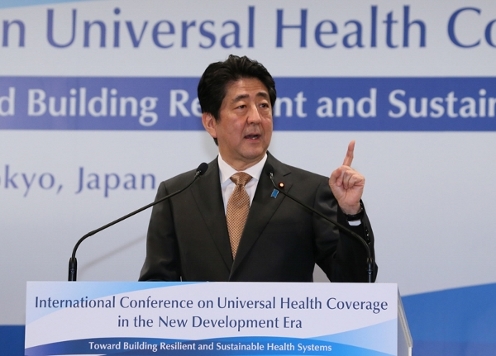Home > News > Speeches and Statements by the Prime Minister > December 2015 > Statement by Prime Minister Shinzo Abe at International Conference on Universal Health Coverage in the New Development Era: Toward Building Resilient and Sustainable Health Systems
Speeches and Statements by the Prime Minister
Statement by Prime Minister Shinzo Abe at International Conference on Universal Health Coverage in the New Development Era: Toward Building Resilient and Sustainable Health Systems
December 16, 2015

[Provisional Translation]
Excellencies, Distinguished guest, Ladies and Gentlemen,
I would like to begin by thanking you sincerely for coming to today’s International Conference entitled “Universal Health Coverage in the New Development Era: Toward Building Resilient and Sustainable Health Systems”.
Japan has long contributed to global health challenges by mobilizing expertise, taking actions and producing tangible results. The reason why Japan prioritizes health comes from our conviction that it is among the most important elements in the concept of human security, which strives for the protection and empowerment of all individuals, and the fulfillment of their potential.
One of the overarching goals of my tenure as Prime Minister has been to make a “Proactive Contribution to Peace” based on the principles of international cooperation. This means that contributing to world peace and prosperity is a fundamental principle and aim of Japan’s foreign policy. To this end, I believe that playing a major role in the effort to meet global challenges including global health, based on the concept of human security, is nothing less than the implementation of our ‘Proactive Contribution to Peace’.
The 2030 Agenda for Sustainable Development was adopted at the United Nations this year. The 2030 Agenda includes numerous health related targets to be achieved including the achievement of Universal Health Coverage (UHC)which Japan has long been promotingas well as a wide range of countermeasures against diseases including infectious diseases. Next year, Japan will be the first country to assume the G7 Presidency after the adoption of the new Agenda and will also serve as one of the co-organizers of the Sixth Tokyo International Conference on African Development (TICAD VI), which is to be held for the first time in Africa.
I intend to take up health as a priority agenda at the G7 Ise Shima summit, and I would like to lead the discussion on the health challenges that the world faces in close cooperation with the other G7 countries. With this mind, I published an article “Japan’s vision for a peaceful and healthier world” in the Lancet last week outlining Japan’s position and efforts on Global Health.
What are the health challenges that the world is currently facing? As I see it, there are two key areas:
First, we need to strengthen the response to public health emergencies. During the recent Ebola outbreak, we lost many lives due in part to slow detection and reporting of the emergence of the disease in each country and to an inadequate response by the international community. In this globalized world, we need to proactively implement global measures that can respond swiftly and effectively to the emergence of an epidemic of infectious disease or other public health emergency. For example, the Pandemic Emergency Financing Facility (PEF) proposed by World Bank and the Contingency Fund for Emergencies (CFE) established by WHO are important tools to mobilize necessary financial resources when a public health emergency occurs. Japan also supports the Global Health Security Agenda (GHSA) to strengthen each country’s capacities to fight against infectious diseases.
Second, we need to provide basic health services to all individuals throughout the entirety of their life course in order to cover various challenges ranging from maternal and new born health to malnutrition, non-communicable diseases and ageing. I believe that Universal Health Coverage, which is the provision of basic health services to every individual at an affordable cost, is necessary to the stable development of society. At the same time, UHC will also strengthen national capacities to prevent, detect, and respond to epidemic and endemic infectious diseases, thereby contributing to better preparedness against public health emergencies.
In order to address these two issues simultaneously, I believe that health systems need to be resilient, sustainable, and inclusive. To develop such health systems in accordance with the unique circumstances of each respective country, strong political will, clear plans, and the mobilization of adequate financial and human resources on a global scale including among developing countries are indispensable. It is also important that relevant international organizations and donors share a common vision and strengthen their collaboration.
For its part, Japan will continue the discussion on antimicrobial resistance (AMR) taken up by the current G7 president, Germany. The “one health approach,” which addresses both human and animal health together, is necessary to respond to the rise of AMR. Furthermore, it is also important to encourage research and development of drugs, including drugs for the treatment of AMR and neglected tropical diseases (NTDs) through public-private partnership.
Excellencies, Distinguished guests, Ladies and Gentlemen,
I believe that this conference has been be a concrete step forward on global health issues including the strengthening of health systems towards the G7 summit next year. I look forward to frank and fruitful discussions in the coming year.
Thank you for your kind attention.
